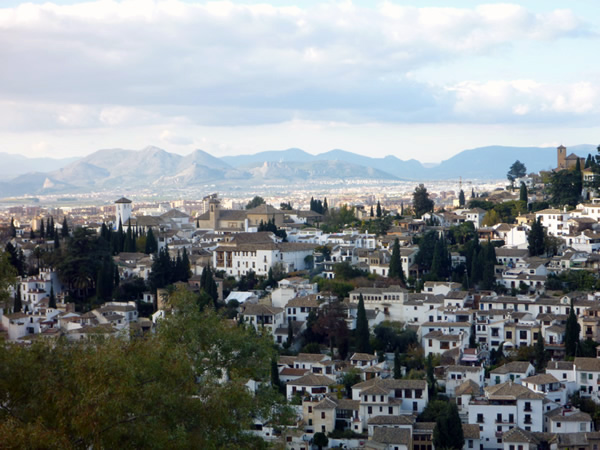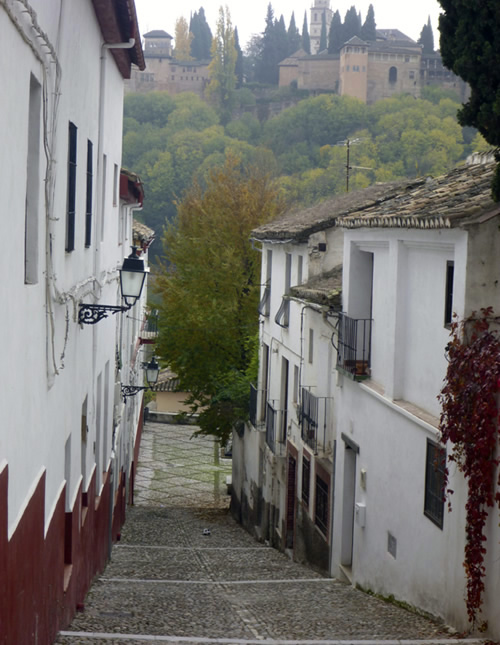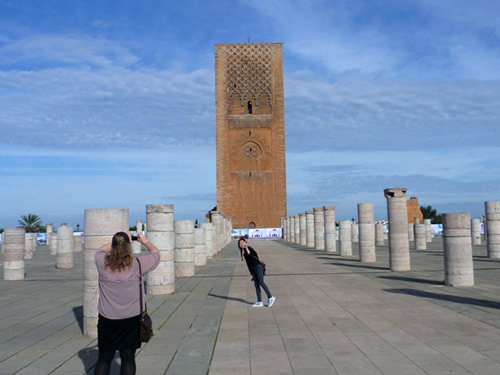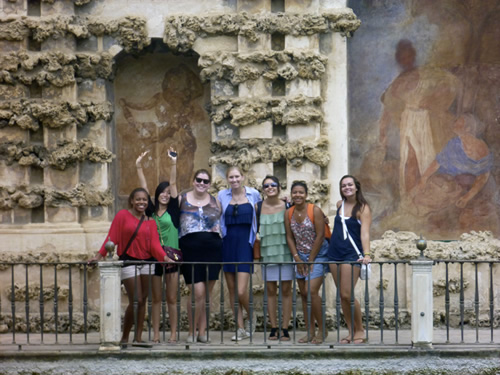How and Why to Learn Spanish in Granada, Spain
Article and photos by Izzy Hendry

|
|
A view of Granada set in front of the Sierra Nevada mountains.
|
It's December, almost the end of my time in Granada. I'm sitting with a friend in Café Antigua, a hole-in-the-wall tapas bar, trying to decide on our favorite memories from our time in Granada. I mentally flick through uproarious laughter during Salsa club, long conversations over gazpacho about Spanish politics, and wandering alone in the streets of a nearby village, Jaén. I finally decided on the weekly fútbol (soccer) games with friends from my program and some of our local language partners.
Although many of us hadn't touched a soccer ball in years, these games quickly became the high point of my week. Not only did we learn some not-so-classroom-appropriate vocabulary from our Spanish friends, but after the games, we would usually head, still sweaty, over to
Pizza Metro
and try to consume two whole meters of pizza. Our weekly fútbol games made me feel like a real Spaniard: I loved running into people from my dorm on the way down to the field and getting an approving nod or occasionally a request to join in next time.
Why Granada?
Fortunately, I have found few people who are as forgiving as Spaniards when you absolutely butcher their language. The Spaniards I met have also been remarkably open to talking about all aspects of Spanish life, and the friends I made and conversations I had fundamentally changed the way I look at life in the U.S. One of the most important lessons I learned is to value time spent with friends and family just as much as time spent working. In the U.S., eating a 3-hour dinner is called procrastination. In Spain, it's called friendship.
Of all of the cities in Spain, I chose Granada for many reasons. The first criterion was that they only speak Spanish in Granada rather than Basque or Catalan, which is spoken in much of the north, including Barcelona.
Second, Granada is relatively small geographically and population-wise: it numbers around 300,000 people, and you can cross the city by bus in about an hour.
Third, Granada is undoubtedly a university town: La Universidad de Granada is the largest in Spain, making up almost a third of the city's population. This means that the city is full of people my age, boasts a wide variety of nightlife, and has a healthy population of ERASMUS (European exchange) students, meaning that you won't be the only foreigner in your university classes.
The final reason for choosing Granada was that it's an excellent destination for Islamic Studies. As the last stronghold of the Moorish empires in Europe, it offers thousands of years of incredible architecture and history you won't find anywhere else on the continent, and the University possesses a fabulous Arabic department. My favorite place to visit was the famous Alhambra. This massive Moorish palace complex is one of the world's best-preserved pieces of classical Muslim architecture. If you have a free weekend, I also recommend you take a train to Córdoba and check out the cathedral built smack in the middle of a mosque. It's fascinating to learn about another side of European history, whether Islamic Studies is a part of your major, as it is for me, or is entirely new to you.

|
|
Calle de Porras, with a view of the Alhambra.
|
Choosing a Program
It’s essential to find a program that will be supportive and helpful without sequestering you with 90 other American students or taking up too much of your time with useless classes and seminars. I chose IES Abroad because it’s excellent for somebody living abroad for the first time: they facilitate the transition while providing opportunities to integrate with the local university community. While at times I felt the program was overbearing or too restrictive (for example, you have to file a travel plan with them if you leave the city), I also appreciated their support. I know it put my parents’ minds at ease.
There are several reasons that I chose this program out of other similar ones:
-
Visa help. Getting a Spanish visa for more than three months can be very complicated if you try to go it alone, so IES advisors can help you out or, in some cases, get the visa for you.
-
A center in Spain offering classes in both Spanish and English and support ranging from help finding a doctor to where to find the best tapas.
-
Orientadores — local students employed by the program to introduce students to the city and help them adjust to university classes.
-
Help enrolling in classes at the University. By help I mean they do it for you, which is a great bonus, since according to my international friends, the bureaucracy can be intimidating.
-
Field trips to several locations in southern Spain and Morocco. The trip to Morocco was incredible because it was very inexpensive and pre-arranged. During our homestays and visits to local non-profits, we gained insight into the daily life of Moroccans.
Regardless of the program you select, I urge you to get as far away from it as possible. Don’t get me wrong: having an immediate group of American friends in the first few weeks is incredible. I encourage staying close to these people, sharing your experiences, or even taking a weekend trip together. On the other hand, it is entirely possible to go to Spain for four months and not hang out with a single Spaniard. To avoid this mistake, I did my best not to spend all my time with people from the program.
My strategy was to take as many university classes as possible (instead of program classes), get involved in clubs in my dorm, and take a watercolor class at the cultural center, Casa de Porras.
Another great resource I discovered for outdoorsy people is the plethora of activities offered by the University. One of my most memorable days in Granada was hiking through the Sierra Nevadas with two German students. At the same time, an older Spanish gentleman explained the difference between papas, pipits, and patatas (three different words for potato) in hilarious detail.
Intercambio groups are also a great way to meet people. These groups are basically language exchanges, which can range from casual chats to something like speed dating. It’s easy to find them through flyers at the university, on Facebook, or advertised in coffee shops.
While I initially struggled with the language barrier, making Spanish friends and hearing about their lives was very rewarding. I will never forget trying to explain to my friend Marco why it is that Americans spend so much time trying to protect their rights to shoot each other, nor will I forget the strange story that Carmen told me about hazing at the school of medicine (hint — it involves spraying each other with ketchup and mustard). I wouldn’t have found these friends if I hadn’t taken a risk and branched out from my program, so even though it’s initially intimidating, I would highly recommend making friends with locals where possible.

|
|
Posing for the camera during our program’s trip to Morocco.
|
Before You Leave
for Spain
Learn as much Spanish as you possibly can! Speaking even a bit will allow you to start forming relationships, but the more, the better! It was exhilarating to chat about the protests with a girl in my class who turned out to be one of the main coordinators. The more you practice Spanish on the front end, the more you’ll be able to improve while you’re there.
It’s also essential to skim, at the very least, the Wikipedia page about Spanish history. Franco may be long gone, but even 500-year-old history is still fresh in the Spanish conscience and manifests itself in many aspects of culture and politics. Brush up before you leave to avoid being that ignorant American.
At La Universidad
One very important bit of information to be aware of from the start and to discuss with your professor on the first day of class is that the Spanish university calendar is entirely different from the American one. The fall semester starts mid-October and runs until February, while the spring semester continues well into June. This can present a problem for students staying only one semester. Luckily, when I told my professors about my dilemma at the beginning of the semester, they all offered to let me take the exam early.
There are also several significant differences between university culture in the U.S. and Spain. The biggest one was that lateness is expected: even the professor is unlikely to arrive within the first five minutes of class. Tardiness is so commonplace that the class schedules have no break between periods to change classes because it is assumed that everyone will be late anyway. Another difference is that eating or drinking in class is rude (yes, even if it’s the first class of the day and you missed breakfast). It took me a long time to learn to satisfy my coffee addiction without the help of a cup to go, but it is possible!
Get to Know the City
Find a “regular place” — somewhere you go once or twice a week to get to know people outside your dorm and your classes. This can become a comforting routine, especially when you feel overwhelmed with new experiences. For my roommate and I, this was a Sunday night Salsa Club at Granada Diez, where we danced every week with the same people, got to practice our Spanish, and learned a little salsa along the way. Despite my dreadful lack of coordination and salsa experience, I had a blast. I learned to laugh hard and often in the true Mediterranean style.
Practical Tips
Bring toilet paper everywhere. While you might occasionally luck out, it was generally my experience that tapas bars, restaurants, and other public places restock their restrooms sporadically (or never?!).
Shoes are worn at all times in Spanish culture. Ideally, nothing important should come in contact with the floor: not even your purse, especially your bare skin. As part of this culture, bare feet are never seen in public or private. Whether in your room, on a 10-hour bus trip, or walking home in heels, taking your shoes off will inspire concern and often revulsion in those around you. As evidence of this cultural norm, dorm rooms come with complimentary slippers, hostels usually have reminders in several languages, and long-distance buses have signs asking that shoes be left on to avoid offending fellow passengers.
Coming Home
You will feel insulted by every waiter and waitress you meet. You will find yourself positively boiling with frustration as they come up to your table five seconds after you sit down, tell you their name and life story, and then return to your table every five minutes to see if everything is okay. By the end of the meal, you’ll find yourself missing indifferent, aloof Spanish servers who understand that lunch should last at least two hours and don’t bring the bill along with the main course.

|
|
Group photo during a weekend trip to Sevilla.
|
Izzy Hendry is a Junior at Scripps College and is originally from Atlanta, Georgia. She studied abroad in Granada, Spain, with IES Abroad. Her major is foreign languages, and she minors in Middle East and North Africa Studies. During the summer, she will study abroad in Morocco with the Critical Language Scholarship program to fulfill her major’s second study abroad requirement.
|
